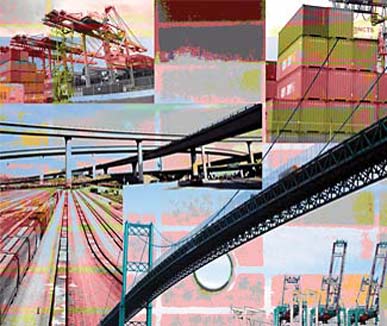Logistics' Need for a World-Class Transportation Infrastructure
How important is the international freight transport system to the U.S. economy? Very.
September 2010

Let's consider the United States as compared to the world:
• We are a very small portion of the word's population: The United States represents roughly 4.5 percent of the world's population; i.e., 95.5 percent of the world's marketplace is somewhere else, and to reach those markets U.S. companies rely on freight transportation.
• The U.S. economy has been an economic power for a century and represents 20 percent of the world economy as measured by GDP. However, in 1970 that figure was 40 percent. Our economy is expected to grow further, but the world's economy is growing much faster.
• Trade is a huge foundation of the global economy - 23 percent of the value of world GDP is the value of exported goods (CIA World Factbook).
We are smaller than we think and we are growing proportionally smaller every year. The world population and economy is growing at a far faster rate than the U.S. population and economy. That said, we are still an extremely powerful economy with some truly amazing economic assets and advantages, and if we are serious about mining growth in global markets, we can be even more successful. However, if we sit back and take certain things for granted, we will slowly fail, and that slide will likely become steeper as the years go on.
Maintaining Economic Competitiveness
To economic planners this must all seem rather simple; there will be increasingly more opportunities to sell U.S. products to others, as there will be more people in other places with more wealth. Nonetheless, U.S. companies are not alone in the world, and it is a very competitive place. Further, we are a long distance from many of these markets, whereas some of our competitors are closer. With tough competition and tight margins, there is little room for inefficiency in our ability to get cargo to and from places like southern Europe or Southeast Asia, western Africa or South America.
The federal government broadly understands this. As an example of high-minded objectives, President Obama has set an extraordinarily high bar for the United States to double its exports from $1 trillion to $2 trillion by 2015. Some call that objective crazy and it may well be - but we need to pay attention to practical issues associated with these sorts of objectives. Exporting by definition will require delivery of goods to a foreign market, and if there are problems in delivering those goods, we are probably destined to lose out to places that have better prepared with strategy and infrastructure.
To the extent that our economy can rely on world-class transportation infrastructure, we have demonstrated that we are not at all serious as a nation. The U.S. Congress seems to show fairly little commitment to investments in road, rail, water, and air infrastructure. It is common to hear frustration from business organizations that because this issue is not "sexy," it gets little attention. Some estimates suggest that we require a minimum of $87 billion of annual infrastructure investment, with some estimates going as high as $148 billion per year (American Manufacturing Institute). Federal investment is not anywhere near those levels, and each year we seem to fall further behind.
Project Announcements
Aerospace Lubricants Expands Columbus, Ohio, Production Operations
01/30/2026
Radical AI Plans Brooklyn, New York, Materials Science Operations
01/28/2026
Germany-Based KettenWulf Plans Auburn, Alabama, Production Operations
01/28/2026
Frontieras North America Plans Mason County, West Virginia, Operations
01/28/2026
North Wind Plans Rosemount, Minnesota, Research Operations
01/27/2026
DSV Global Transport and Logistics Plans Mesa, Arizona, Headquarters Operations
01/24/2026
Most Read
-
The Workforce Bottleneck in America’s Manufacturing Revival
Q4 2025
-
Data Centers in 2025: When Power Became the Gatekeeper
Q4 2025
-
Speed Built In—The Real Differentiator for 2026 Site Selection Projects
Q1 2026
-
Preparing for the Next USMCA Shake-Up
Q4 2025
-
Tariff Shockwaves Hit the Industrial Sector
Q4 2025
-
Top States for Doing Business in 2024: A Continued Legacy of Excellence
Q3 2024
-
Investors Seek Shelter in Food-Focused Real Estate
Q3 2025
